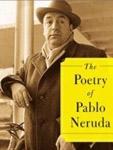
- A Dog Has Died
- A Lemon
- A Song of Despair
- Bird
- Brown and Agile Child
- Canto XII from The Heights of Macchu Picchu
- Cat's Dream
- Clenched Soul
- Drunk as Drunk
- Enigmas
- Fable of the Mermaid and the Drunks
- Fleas interest me so much
- From – Twenty Poems of Love
- from The Book of Questions
- Gentleman Alone
- I Crave Your Mouth, Your Voice, Your Hair
- I Do Not Love You Except Because I Love You
- If You Forget Me
- I'm Explaining a Few Things
- In My Sky At Twilight
- Leaning Into The Afternoons
- Lost in the forest...
- Love
- Magellanic Penguin
- Nothing But Death
- Ode to a Large Tuna in the Market
- Ode to Maize
- Ode to Sadness
- Ode to Salt
- Ode to the Book
- Ode To Wine
- Poetry
- Poor Fellows
- Puedo Escribir
- Saddest Poem
- Some Beasts
- Sonata
- Sonnet LXXXI
- Sonnet VIII
- Sonnet XI
- Sonnet XVII
- Sonnet XXXIV (You are the daughter of the sea)
- The Dictators
- The Light Wraps You
- The Night in Isla Negra
- The Question
- The Saddest Poem
- The Song of Despair
- The Weary One
- The White Mans Burden
- Tonight I Can Write
- Tonight I can write the saddest lines
- Tower Of Light
- Walking Around
- Water
- We Are Many
- Tower Of Light
- Walking Around
- Water
- We Are Many
- XVII (I do not love you...)
- XXXIV (You are the daughter of the sea)
- Your Feet
- Your Laughter
- 上一页下一页
Pablo Neruda (1904-1973)
Pablo Neruda was born in Parall, Chile. He studied in Santiago in the twenties. From 1927 to 1945 he was the Chilean consul in Rangoon, in Java, and then in Barcelona. He joined the Communist Party after the Second World War. Between 1970 and 1973 he served in Allende’s Chilean Government as ambassador to Paris. He died shortly after the coup that ended the Allende Government.
Neruda's career as a poet began with love poetry and ended with love poetry. One of his very last works, written only days before his death, is The End, a love poem to [his wife] Matilde. There were, of course, changes; there were deviations during the period of Residence on Earth, for example; there were turns and innovations during the period of political and epic poetry that began in the late thirties and culminated in 1950 with Canto General, but there was also a remarkable continuity. Erotic poetry and love poetry were for Neruda an important, essential part of his poetic life.
Pablo Neruda was one of the most prolific poets of our century. To trace the development of even one aspect of his poetic world is far from easy. Yet in the case of his erotic poetry and his love poetry the outline of that development is clear enough. The early Neruda, from his first published book, Crepusculario, and then especially in Twenty Poems, is a sensualist and a materialist in his approach to love and woman…. [In Twenty Poems] Neruda intensifies the complete fusion between woman and Nature. Joy and despair, like Marisol and Marisombra, mingle and alternate in this book, but whatever the emotion of the moment, the poet is constant in his identification of woman with Nature, in his use of Nature imagery to describe woman, and in his conception of woman as a vehicle for a return to Nature. In these richly sensual poems, the style is still on the whole modern Romantic with symbolist overtones and the first few hints of the newer, more disturbing poetic styles. Yet they remain constructive poems, in that they are organized around experiences in which real human beings, Neruda himself and the women he loved, provide a stabilizing platform upon which each poem is built.